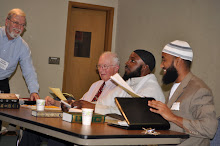By David Unze • dunze@stcloudtimes.com • November 20, 2008
Read Comments(16)Recommend Print this page E-mail this article Share Del.icio.us
Facebook
Digg
Reddit
Newsvine
Buzz up! An unemployment law judge held a hearing Wednesday in St. Cloud for nearly two dozen Somalis who used to work at Gold’n Plump but no longer do because of a dispute over prayer time in the workplace.
The former Gold’n Plump workers are appealing a decision by the state Department of Employment and Economic Development to deny them unemployment benefits. Unemployment Law Judge Frank Villaume III listened to testimony Wednesday and said he would issue a decision in the future.
Gold’n Plump made news earlier this month with the announcement it had settled lawsuits brought by Muslim workers and the Equal Employment Opportunity Commission about prayer breaks at the Cold Spring plant.
The group of workers involved in Wednesday’s hearing at the Lake George Municipal Complex worked for Gold’n Plump in Cold Spring until early September. At issue is whether they were fired or quit.
Villaume said that if the workers quit, he must decide whether it was for a reason that would be considered an exception to the ineligibility for benefits.
And if the workers were fired, he had to decide if it was because of conduct that would make them ineligible for benefits.
Gold’n Plump admitted no wrongdoing in its settlement of the class-action workers’ lawsuit and the EEOC suit, according to testimony Wednesday from Timothy Thornton, an attorney who represented the company in settlement negotiations.
The company settled the lawsuit to stabilize the workplace and stimulate morale, he said.
That settlement allows for two 10-minute breaks — one in the morning and one in the afternoon — instead of one 15-minute break. An unpaid, 30-minute lunch break remains.
The lawsuit settlement calls for Gold’n Plump to pay $215,000 to the EEOC, which will decide who gets that money and how much. The settlement is scheduled for final approval Feb. 17 in U.S. District Court
Thursday, November 20, 2008
Subscribe to:
Comments (Atom)

















































